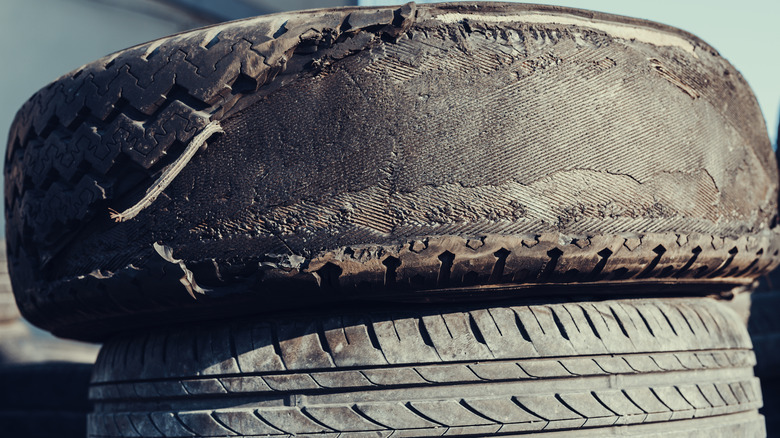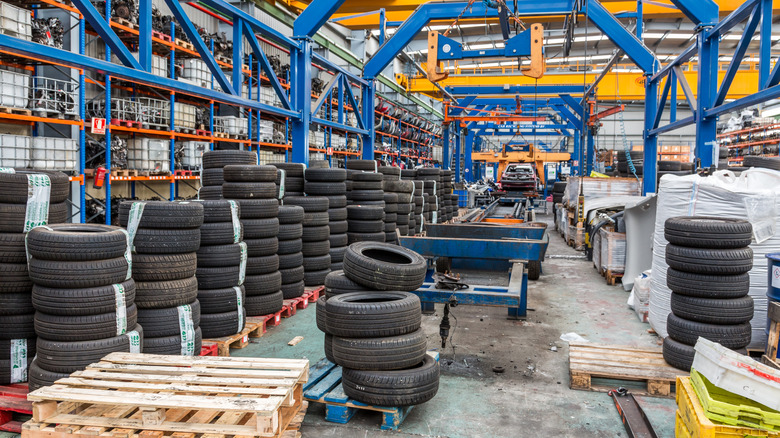
When it comes to pollution, the fossil-fuel dependency suffered by the cars we love is often specified as a primary culprit. Yet, there is another environmental threat posed by all cars that has nothing to do with the combustion engine (even EVs can't escape this one). Car tires, when not disposed of properly, pose both immediate and long-term environmental risks.
To mitigate these risks, there are fee structures imposed by various entities when you purchase and install new tires. There are two types of fees; the state tire fee (also known as waste tire fee, environmental fee, tire user fee, etc.), which is mandated at the state level and collected when you buy new tires, and the tire disposal fee for the recycling of old tires, which can be charged by different entities (like the retailer or city government) depending on who is handling the disposal.
In states with mandatory tire fees (which is most of them), you'll be required to pay this fee at the point of purchase unless you meet your state's exemption criteria. These fees typically range from $0.25 to $2 per tire unless you have off-roaders or other non-standard tires, which could have more expensive fees. These funds go toward tire recycling programs and other efforts to mitigate the environmental consequences of improper tire disposal. Tire disposal fees are charged by the disposing entity; for example, by your city if they have a tire disposal program or by a retailer who disposes of the old tires when you take your car in for a new set. The price for these fees also varies, but you can expect it to be at least a few bucks per tire.
 Oliver Helbig/Getty Images
Oliver Helbig/Getty Images
Tire waste poses a significant environmental risk. Over the long term, during both active use (which results in toxic tire dust emission) and the eighty-plus years it takes for an individual tire to break down, harmful chemicals will be released by the tire into the environment, such as carbon dioxide and microplastics. In the short term, retired tires that are left to loiter pose a fire hazard and can become a breeding ground for insects and pests. If you willfully leave old tires in your backyard, you're practically inviting a mosquito problem.
Government-mandated fees that facilitate proper tire recycling are imposed to prevent these issues. Through tire recycling programs, tires are remade into other products like artificial turf, landscaping material, playground surfaces, doormats, and other materials. Your mandatory payment of state tire fees makes the transformation of old tires into new products possible, and in some cases, funds research into new methods of doing so. For this system to work, though, someone has to get your old tires to the recycling point. If you'd prefer not to be that someone, that's where the tire disposal fee comes in. This covers the cost of transferring your old tires from point A to point B.
 Santiago Urquijo/Getty Images
Santiago Urquijo/Getty Images
When it's time to dispose of your old tires in exchange for some new rubber, you've got a couple of options. If you want to risk hefty fines and possible jail time depending on your state's disposal laws, you could just dump them on the side of your least favorite highway, burn them, or throw them in a dumpster. Improper tire disposal isn't just environmentally damaging; it's also highly illegal.
However, if you care about the planet, your wallet, your fellow citizens, following the law, and all that jazz, you should either transport your old tires to a recycling facility or bring them to someone who can do that for you (for a tire disposal fee), such as your mechanic. Some dealers will also buy tires that are in acceptable condition, meaning no holes or cracks. Recycling your tires is the right way to go — even Formula One tires are recycled. If you aren't able to repurpose or have your tires recycled on your own, it's probably best to save the headache and cooperate with your local tire disposal practices and their associated (but likely small) fees.
















